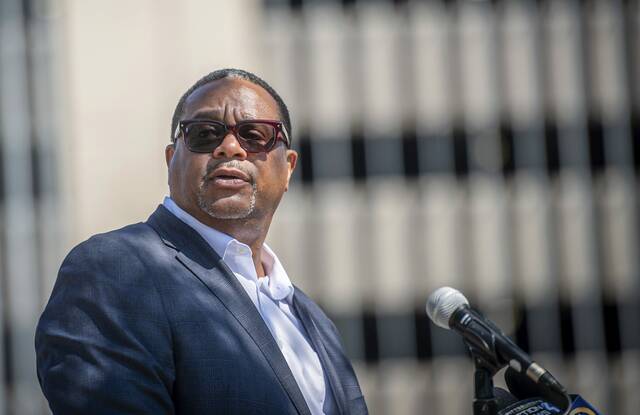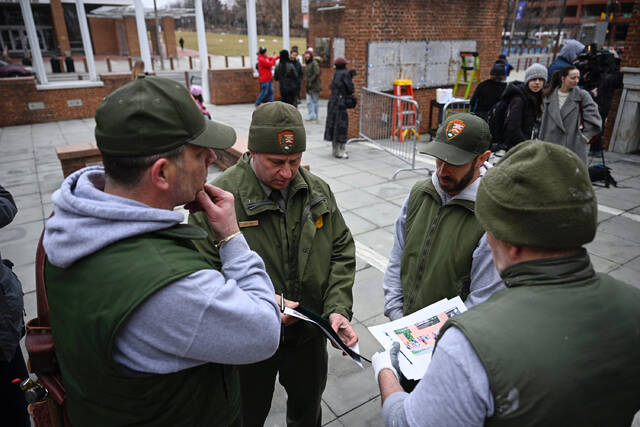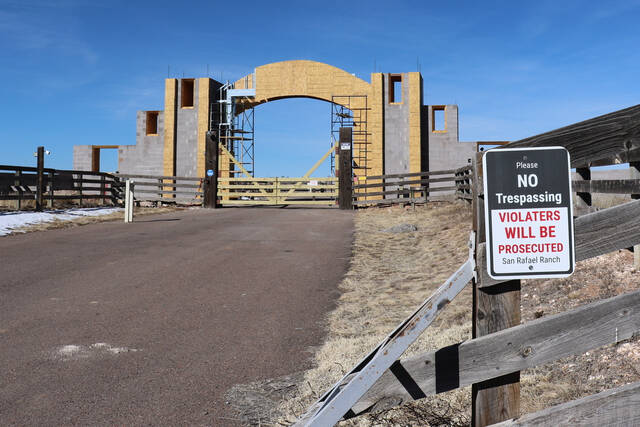In September 2024, Pittsburgh Mayor Ed Gainey set out to tackle a critical priority of his administration, what he called the “affordable housing crisis.”
Unveiling a set of sweeping reforms, Gainey wanted developers across the city to set aside a portion of new construction for poor people to rent at low rates.
“Our goal is to create a city where everyone has the opportunity to thrive,” the mayor said. “That starts with ensuring access to affordable, quality housing.”
But some City Council members balked, depriving Gainey of critical support.
On the very day Gainey launched his initiative, Councilman Bob Charland, a frequent opponent, criticized the mayor for what he viewed as pressuring council to back the plan before any public discussion.
Now, with less than three months left as mayor, Gainey is on the verge of leaving Grant Street without what he hoped would be a signature accomplishment of his tenure.
Negotiations with council over affordable housing legislation have collapsed. Compromise packages appear out of reach. And both sides are dug in.
Councilwoman Erika Strassburger, D-Squirrel Hill, intends next week to introduce an amendment to overhaul Gainey’s bill.
But it may be to no avail.
Strassburger’s changes are so drastic — she would gut the requirement to force developers to include affordable housing in their projects, making it optional instead — they would almost certainly not make it past Gainey.
Jake Pawlak, the mayor’s top advisor, said his boss would strike down the package altogether if it reached his desk.
Long-simmering debate
City officials for more than a year have been debating Gainey’s push for what is called inclusionary zoning, a policy that mandates developers set aside a portion of housing units as affordable to low-income residents.
Under Gainey’s initial proposal, any new development with 20 or more housing units would have to earmark at least 10% of them as affordable.
Gainey wants that rule in place citywide, a significant expansion of the city’s existing inclusionary zoning program, which covers only Lawrenceville, Bloomfield, Polish Hill and Oakland.
Gainey’s push for a blanket policy across all of Pittsburgh was met with stiff opposition from some council members.
Housing advocates were also split. Some applauded Gainey’s plan. Others worried it would deter development, leading to less new housing overall.
Affordable housing has been a key focus for the Gainey administration.
Gainey got council to sign off on paying for a costly and controversial bond for the Urban Redevelopment Authority that would fund housing, made strides in pushing the city’s land bank forward to return blighted properties to productive use, and signed orders protecting against housing discrimination.
But a path forward for the inclusionary zoning bill he has supported so fervently seems unclear.
Council already struck down one competing bill — pitched by Charland, D-South Side — that would have allowed each neighborhood to decide for itself whether to mandate inclusionary zoning within its boundaries.
Since then, Strassburger has spent months working with top Gainey administration officials to hammer out a compromise that could earn from council the requisite five votes for passage and strike a balance between competing concerns.
Those negotiations, Strassburger and Pawlak said, have crumbled within the last two weeks.
Pawlak said the administration felt it had made “significant concessions,” but Strassburger said they didn’t go far enough for her to feel comfortable with the proposal.
Gainey’s concessions
About two weeks ago, Pawlak shared with Strassburger the latest in a series of potential compromises.
The most recent proposed amendment penned by the Gainey administration would still mandate inclusionary zoning but offer more generous tax breaks to help developers afford the affordable housing requirement.
That aimed to address a longstanding concern from some council members that developers would find their projects couldn’t work financially if they included affordable units.
“The premise there is that if your deal works today without inclusionary zoning, it would work under this bill,” Pawlak said.
Strassburger pointed out that tax incentive would require Allegheny County and Pittsburgh Public Schools to also sign off. She didn’t want to have to rely on that.
Also included in Gainey’s compromise proposal was an option allowing developers to pay into a housing fund rather than creating affordable housing within their developments.
The fee for developers would be $32 per square foot of residential floor area.
The administration also pitched slashing the length of time housing units must remain affordable to 35 years from 99.
Another concession: pushing back the start date for mandatory inclusionary zoning until April.
Pawlak said that would give some projects now in the pipeline time to move ahead before the new rules were enforced.
Strassburger’s plan
Under Strassburger’s amendment, developers would be offered incentives to build affordable housing but not be forced to, except where it currently is a requirement.
Strassburger dubbed her plan an affordable housing bonus program, shedding the term “inclusionary zoning” altogether.
Developers could erect taller structures and avoid certain building requirements in exchange for creating affordable units.
Or they could simply pay $25 per square foot of residential floor space to earn the same perks without building affordable housing.
Her bill, like Gainey’s, would go into effect in April and leave existing inclusionary zoning areas untouched.
Strassburger said she also supported an enhanced tax break as a further incentive, though such a measure would have to be approved separately.
The councilwoman’s amendment also would require the city’s planning department to create a report detailing how the program is working and offering recommendations for improvements within two years.
Strassburger initially attempted to place her measure on council’s agenda for a preliminary vote Wednesday.
But she was unable to get support to add the bill at the last moment because one of her allies on council was running late and missed the vote.
She now plans to put the measure to a vote next week.
‘Killing his own bill’
Both Strassburger and Pawlak said they’re willing to work toward further compromise before then.
“Negotiations aren’t done until the bill is passed and signed,” said Alex Wallach Hanson, executive director of Pittsburgh United and a staunch advocate for inclusionary zoning.
The public, he said, will have other opportunities to voice their opinions to council members.
Residents and local housing advocates have turned up in droves at public meetings, with one Planning Commission hearing dragging beyond midnight as scores of people shared their thoughts.
Councilwoman Barb Warwick, D-Greenfield, on Wednesday urged council to slow down the process to move Strassburger’s amendment forward.
“We owe it to everybody who’s been working so hard, both sides,” Warwick said.
Strassburger is one of five members of the nine-member body who have said they could not support Gainey’s bill.
But her measure faces an uphill climb to approval, too.
If Gainey vetoes it, six council members would need to support the measure to override his veto. Strassburger would likely be one ally shy of an override.
A veto of the bill with Strassburger’s amendment tacked on would kill the whole package — Gainey’s inclusionary zoning proposal along with the councilwoman’s changes.
“He’s killing his own bill, which would be ironically great,” said Councilman Anthony Coghill, D-Beechview, a vocal critic of Gainey and of inclusionary zoning.
“I think the mayor’s hellbent on forcing inclusionary zoning. If he wants to veto it, that’s fine by me.”
Elusive common ground
Gainey is in the waning months of his one-term mayoral administration after losing the Democratic primary.
Neither contender vying to replace him in the November general election supports a citywide inclusionary zoning mandate.
Wallach Hanson believes mandatory inclusionary zoning is the way to go, especially in “hot markets” where housing prices skyrocket and new developments threaten to push out existing residents.
“Inclusionary zoning ensures we are desegregating neighborhoods,” Wallach Hanson said. “At the core, this conversation around affordable housing is about who gets to benefit when new development comes to the city.”
David Vatz, who heads Pro Housing Pittsburgh, has voiced worries that mandated inclusionary zoning would curb housing development altogether.
Vatz pointed out that both Strassburger’s and Gainey’s efforts are meant to bolster the city’s supply of affordable housing.
“It’s either you do nothing at all or you do something where there’s enough common ground where you get five votes,” Vatz said. “We need policies that are going to encourage people to build more housing.”
Strassburger said she doesn’t view the negotiations she had with the Gainey administration as a failure. She described her proposed amendment as “a middle path that does no harm.”
She pointed out that both sides seem willing to support a larger tax break for developers who build affordable housing.
They also seem to be willing to create a fund where developers who don’t build affordable housing could pay a fee that supports housing efforts.
Pitching a separate proposal that the Gainey administration couldn’t back, she said, was “not my desire.”
“I was truly hoping we could find something everyone could work on together,” Strassburger said. “But we need a program that’s actually going to work.”
Pawlak, on the other hand, said Strassburger veered from negotiations and crafted an amendment beyond anything they had discussed.
“Obviously, it goes much beyond the terms we had been negotiating,” Pawlak said. “The changes here are dramatic.”








